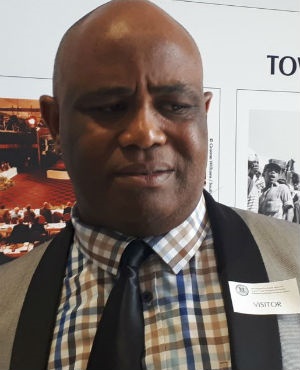
Cape Town - Day Zero or no Day Zero, the police and army are ready to guard and escort the transport of water to ration collection points across Cape Town, the Western Cape legislature heard on Wednesday.
"Whatever threat is coming, we shall be able to deal with it," said provincial commissioner Major General Mpumelele Manci.
Briefing the committee on community safety, the, provincial head of the polices operations command centre, Brigadier Jorina Zandberg, said if Day Zero was declared, the provincial joint operations centre would be activated.
It will be linked up to the provincial disaster centre and plans to start delivering water tankers to around 187 Points of Distribution (Pods) for when water rationing begins.
READ #DayZero: Cape Town buys one more month
Day Zero is the term used to describe the day the dams that feed the city's water supply reach levels too low to draw water.
The latest update, released on Tuesday, stated that dam levels were at an average storage level of 24%. The last 10% of the water is not usable.
Due to water saving efforts by Capetonians, currently restricted to a maximum of 50l of water a day, and the release of water from private farm dams, Day Zero has been pushed back to July 7.
However, in spite of the perceived reduced risk of the city running out of water, and growing denialism and conspiracy theories over the Day Zero campaign, the police and army are taking no chances.
Zandberg said around 600 police officers, metro police and SA National Defence Force (SANDF) personnel would be on hand to protect the 187 water Pods set up around the city.
Water 'Pods' to be guarded
Police considered the majority of the Pods in Cape Town as low risk, but in areas like Nyanga, some parts of Khayelitsha, Kraaifontein, Belhar, Atlantis and Mfuleni, Pods were considered high risk.
READ: Schools will not close on Day Zero - Zille
At least 60 soldiers would escort the water tankers to the Pods and Public Order Police would be on permanent standby in case there was any civil unrest.
If Day Zero is declared, drinking water will be rationed to 25l per person in Cape Town to make available water last until proper rains replenish dams, and it will only be available at the Pods.
People will have to queue at the Pods to fill up with water and plans are in place for on-foot and drive-through options for collection.
Zandberg said the 16 policing divisions, or "clusters" in Cape Town had divided the Pods into 86 that were high risk, 21 that were medium risk, and 80 which were low risk.
The remaining Pod risk grading was still to be done by City of Cape Town engineers, police crime intelligence and disaster risk management.
They had examined the reported crime in areas where the Pods would be situated, as well as the history and likelihood of protests in the area.
The high risk Pods would get the most safety staff, with five SAPS officers, five metro police officers, and five law enforcement officers, Zandberg said. They would be assisted by neighbourhood watches, in order to bring the total safety and patrol staff number up to 20.
Negotiations were still underway with private security companies to assist.
Medium and low risk Pods would get less safety officers, but would still be guarded and patrolled.
'Chopper drops'
The SANDF would send soldiers for each cluster, plus an additional 60 soldiers would escort the water to the high risk areas and help with patrols.
Crime intelligence would continue to provide information regarding possible threats and early warnings.
Five detectives per policing cluster would be dedicated to any investigation regarding any cases related to the water crisis, Zandberg said.
For the 187 Pods assessed for risk so far, there would be at least 578 security officials permanently posted, with a shift system to make sure the Pods were always guarded.
"As we get more information, we will continue to work on our contingency plan regarding safety and security," said Zandberg.
Manci added that there would also be "chopper drops" of army or police where needed if problems or unrest flared up, and police helicopters would keep a bird's eye view of operations.
He said it was also important for the police to keep their normal patrolling and crime prevention in place during the Day Zero operations.
The police would also work with the City of Cape Town to arrest people who were contravening the increasingly stricter water use regulations.
Ban on sale of municipal water
On Tuesday, the City warned that the resale of unmodified municipal water without permission from the City's director for water and waste services was prohibited, and that no more applications would be granted during the drought.
This includes the sale of modified municipal water, whether through filtration, ozone, carbonation and related methods, bottled or not, where the end product remains water.
The restriction does not apply to water from springs.
Water from private boreholes is also not meant for sale, and commercial and industrial entities must still seek the necessary authorisation from the department to sell surface and groundwater.
Businesses selling groundwater and/or surface water must also declare the source and display proof of authorisation from the National Department of Water and Sanitation, on any vehicle or transportation mode and retail outlet dispensing such water.
Zandberg said the police, army and other officials keeping the emergency water supplies safe would be given transport to and from where they are deployed.
The 10111 police emergency centre's own water supply had also been secured to make sure there were no water-related disruptions to emergency services, she added.
Zandberg reiterated that water supply in informal settlements would not be affected because the outdoor taps were already considered distribution points, but police would be deployed to those points to monitor safety.
Premier Helen Zille announced in January that schools would also remain open.
KEEP UPDATED on the latest news by subscribing to our FREE newsletter.
- FOLLOW News24 on Twitter




 Publications
Publications
 Partners
Partners























